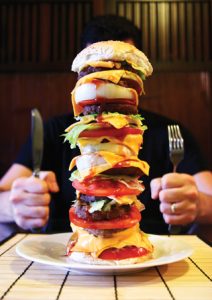The Most/Least Popular Sin
Lucas Damoff
 In 2013, the French electronica duo Daft Punk released a trailer for their upcoming album at the Coachella music festival. Anticipation was high, as they had not released any new material since 2005. The story goes that Guy Manuel de Homem-Christo and Thomas Bangalter, the members of the duo, looked on in amusement as the main stage crowd went wild at the first few snippets of sound. What was so amusing was that even though both of the men were wildly popular, and standing right there among the cheering and adoring crowd, no one recognized them for who they were.
In 2013, the French electronica duo Daft Punk released a trailer for their upcoming album at the Coachella music festival. Anticipation was high, as they had not released any new material since 2005. The story goes that Guy Manuel de Homem-Christo and Thomas Bangalter, the members of the duo, looked on in amusement as the main stage crowd went wild at the first few snippets of sound. What was so amusing was that even though both of the men were wildly popular, and standing right there among the cheering and adoring crowd, no one recognized them for who they were.
Gluttony is not a very popular sin. Or perhaps, more precisely, gluttony is an incredibly popular sin that is hardly ever recognized for what it is. The members of Daft Punk purposefully disguise their identities on stage with futuristic helmets and dramatic costumes. How gluttony has managed to fly under the radar is not as clear. We have probably all been guilty of it at one time or another, yet so often the only discomfort it causes us comes from the pangs of indigestion and not pangs of conscience.
So let’s go back to basics. What is gluttony? It is not simply overeating or being overweight, but rather an attitude towards that lends itself to such things. We might do well to begin by defining gluttony as taking more than we need. It is having seconds when our first helping satisfied our hunger. It is taking two cookies at the end of a meal instead of one.
Now a criticism might come that this is an awfully draconian view of life. Doesn’t God want us to enjoy the Creation that He made? Didn’t He make food so that it was both nourishing and enjoyable to eat? Is it really so bad to sometimes eat simply in order for the pleasure one takes in the flavors? To this I would say, of course!
But one must be incredibly diligent to examine where one is finding delight. And this is where we might want to nuance our first definition: gluttony seeks pleasure from taking more than is needed. So I must ask myself, is the enjoyment I get from food filled with gratitude to the God who made such wonderful food and has given me such an abundance? Or does my enjoyment only have the thing itself in view? The first might well be a worshipful experience, the second is most certainly not.
It is fair to say that most of us could do with a lot less than what we have. We are blessed to live in a culture that is experiencing a season of great abundance. But this Lent let us all take times to consider, how much do we look at our abundance itself to give us comfort and joy, instead of the God from which all abundance flows? How often do we thoughtlessly take more than what we need simply because our culture tells us we can afford it than it is our right to do so?
If every moral prohibition has an accompanying positive command, than a prohibition on gluttony has its corollary in joyfully sharing our resources, even to the point of doing without. The early monastics made a practice of fasting, in part for the sake of their spiritual discipleship, but also in part to be generous. In the limitation of the economy of their age skipping a meal meant they had food to give to someone else who was hungry. We may not always see an one to one correlation between practicing temperance and the ability to be generous to the poor, but cultivating the one may very well lead us further into the practice of the other.
This Lent may we take the time to do all of this in humble gratitude to Jesus Christ that we may find our hearts transformed. That we no longer look to the fleeting things of this world for comfort and joy, but instead find a deeper richer fuller joy in the one who forsook the abundance of heaven in order to generously give from His own body the food and drink which nourishes us not merely temporally, but into all eternity.










